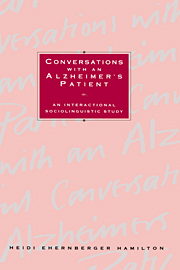3 - Questions
Published online by Cambridge University Press: 27 March 2010
Summary
Maintaining coherent interaction which is socially acceptable to both conversational partners against the backdrop of communicative problems as discussed in chapter 2 is not easy. Choices need to be made regarding how to deal with the nonsuccess. In an attempt to ward off or lessen the threat of a breakdown, the “normal” interlocutor can accommodate “before-the-fact” to the disabled partner's communicative abilities and difficulties, allowing the disabled interlocutor to function at a higher level than would otherwise be possible. This preventive strategy is only effective, of course, if the “normal” individual's perceptions of the disabled individual's abilities match actual ability, i.e., that they do not result in overaccommodation.
In this chapter, I examine 518 questions asked by Elsie and me in five selected conversations. Within a framework of division of labor in discourse, many of the relationships between Elsie's and my question production can be understood. When Elsie produces increasingly fewer questions, I produce more. When Elsie seems less able to respond linguistically to my questions, I produce more questions which can be answered by actions, not words. When Elsie seems less able to talk about distant people, objects, and events, I make increasing use of proximal reference. Further, the next chapter, which analyses response strategies, will provide evidence that Elsie's decreasing ability to respond appropriately to wh-questions is met by my increased numbers of yes-no questions to her rather than wh-questions.
- Type
- Chapter
- Information
- Conversations with an Alzheimer's PatientAn Interactional Sociolinguistic Study, pp. 78 - 107Publisher: Cambridge University PressPrint publication year: 1994



